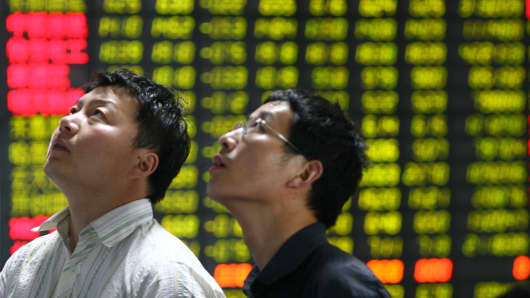China's beaten-down equity market will end 2012 in negative territory for the fourth year in a row, as fears of a hard landing coupled with global headwinds, saw investors turn their backs on Chinese stocks.
The benchmark Shanghai index is Asia's worst performing stock market after Sri Lanka's, having fallen 6 percent so far this year, according to Thomson Reuters data. The index, down 66 percent from a peak hit in 2007, touched a four-year low earlier this month.
An economic slowdown, weak corporate profits and uncertainty before the start of a leadership transition in November have undermined the market and kept key retail investors away.
But news out of China has turned positive with recent economic data pointing to a rebound in the world's second-largest economy. Can this improving sentiment trigger a long-awaited turnaround in the country's stock market in the new year?
(Read more: Coming Soon: China's Growth Resurgence)
Himanshu Shah, president and CIO of Shah Capital, a North Carolina-based hedge fund that manages $200 million in U.S. and China focused funds, says there are four reasons why he thinks Chinese stocks are poised for a strong year ahead.
They are: historically low valuations, monetary tightening of the past 2-1/2 years that has weighed on the market, but is now over, earnings growth that is likely to pick up in 2013 and economic reforms such as liberalizing interest rates that should lift investor sentiment.
"All of these things are not priced into the market and that's why we are very bullish on China shares next year," he said.
Green Shoots
Net income among China's industrial companies gained 20.5 percent in October from a year earlier, according to China's statistics bureau. Profits rose 7.8 percent in September from a year earlier, the first increase in six months.
After seven quarters of slowing gross domestic product (GDP) growth, the economy is picking up momentum. Latest data showing factory output and retail sales also jumped to eight-month highs in November.
Standard Chartered expects this pickup in corporate profits and in GDP growth to push Chinese shares up 13 percent next year. HSBC has also revised up its targets for Chinese stocks, forecasting that major China indices will give returns between 19 percent and 26 percent in 2013.
The Shanghai Composite is trading at a price-to-earnings ratio of about 10, the cheapest since 2008. Compare that to the Hong Kong's Hang Seng, which is trading at almost 12 and Japan's Nikkei, which has a price-to-earnings ratio of about 14.
(Read More: Will Asia's Best Performing Markets Stay on Top in 2013? )
An encouraging sign for China bulls and indicative perhaps of what to expect in the new year is the fact that Chinese shares have rallied almost 6 percent from a 4-year low hit on December 4.
Shanghai's stock market was up more than 4 percent on Friday, lifted by a survey from HSBC showing manufacturing activity in China hit a 14-month high in December.
Word of Caution
Despite the building optimism, analysts warn that because previous rallies have fizzled out there are plenty of reasons to be cautious.
(Read More: China's New Leader Gives Market a Fillip, but Will It Last?)
"We're still underweight China (in the short-term), we still prefer the Hong Kong equity market," Markus Rosgen, head of regional strategy at Citi Investment Research, said.
"But in terms of the outlook for the next 12 months, we're more optimistic on China than we have been historically for the reason that a lot of the data that we are looking at is likely to improve," he said. "On top of that we have very cheap valuations. So at some stage the better data, the cheap valuations will actually turn out to be an outperformance but for the time being, we think Hong Kong will have the upper hand."
Hong Kong stocks have soared some 20 percent this year, making the Hang Seng among Asia's best performing equity markets.
Phillip Chan, director with Shenyin Wanguo Securities in Hong Kong, also puts himself in the cautiously optimistic camp.
While China's new leaders like incoming president Xi Jinping have stressed the need for economic and market reform, there is still uncertainty, say analysts, over how and when these reforms will be implemented and its impact on Chinese shares.
"A lot of positive things are in place for a rebound – the new leadership, talk of reform. But it will take time before we see any significant developments so we don't see substantial upside for the market," he said.
(Read More: Will China's New Leadership Usher Bull Run for Stocks?)
Bank of America Merrill Lynch expects 2013 to be another difficult year for the Chinese equity market. Its analyst David Cui said in a note: "Despite some recent signs of stabilization in the economy, the key concern behind the market's underperformance since the global financial crisis is how sustainable is China's growth."
Watch Retail Investors
Analysts also pointed out the importance of retail investors in China's stock markets. They make up almost 80 percent of turnover at the Shanghai and Shenzhen stock exchanges and unless confidence returns among retail investors, the markets will struggle to get off the ground.
"The main thing is that retail investors have been out of the market since 2009. They need to have faith in equities again and that may happen when corporates start to grow profits," said Shenyin Wanguo Securities' Chan.
Any signs of a sustained rally could tempt retail investors back in force, after all there is a "herd mentality" that can dictate the direction of markets, analysts added.
"Sentiment has been extremely bearish especially among retail investors, and let's face it, it's because no one has made money on China," said Shah. "An outperformance in the market will encourage retail investors to come back and we are starting to see this."


